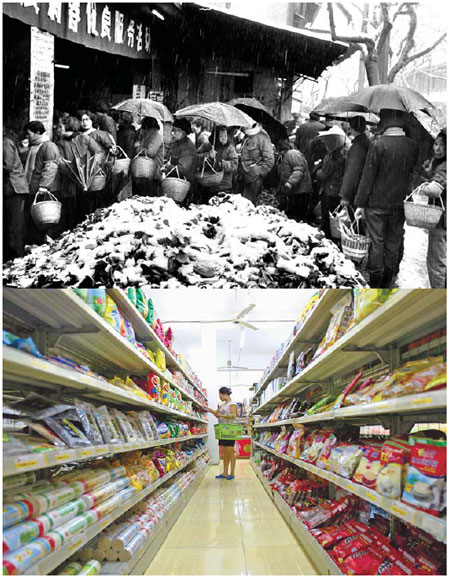Economy and Trade
Shopping changes from chore to choice
By Zhang Jin (China Daily)
Updated: 2011-06-01 10:13
 |
Large Medium Small |
|
Top: Residents queue in the snow to buy vegetables in 1983. Above: A customer picks goods at a shopping center in Zhuji, Zhejiang province. Top: Wu Guofang / for China Daily; Above: Guo Bing / for China Daily |

Zhou Qiyuan does not like shopping. His distaste for shopping spans many years. "There was nothing to shop for in the late 1970s and early 1980s," says the 65-year-old Beijing resident. "It was all about getting coupons, standing in long queues, choosing from the few goods that were available and, more often than not, being bullied by salespersons."
Almost everyone shared Zhou's experience three decades ago, when China imposed a strict ration system. Shopping in those days was all about food coupons or, for the luckier ones, foreign exchange certificates.
"Cash did not make sense," says Zhou, an ace tennis player for the People's Liberation Army in the 1970s.
"And even if you had coupons, you couldn't buy much for supply was limited - rice, noodles, seasonal vegetables, pork, eggs and sometimes milk. That's all ..."
But those were also the years when China's free market started taking shape with shops and wet markets, most of them run by the State, in cities across the country. The retail sector started growing in the 1980s, and almost every town had one or two State-owned department stores, says Cindy Chung, an analyst with the Shanghai-based Universal Consultancy.
Most of stores were known by their numbers and often called No 1 or No 2 store. "That was the legacy of the planned economy," says the 42-year-old Chung.
Apart from his thin wallet, what made Zhou hate shopping was the poor customer service in shops. Private retailers, however, provided better customer service even in the 1980s. No wonder, their business started booming with getihu, or self-employed individual businesses, mushrooming across the country. It's another matter that many of them were just roadside kiosks or small grocery stores. By 1999, China had 31.7 million getihu, most of them in the retail business.
The retail industry was the cradle of China's first-generation businesspeople, who grew to be big entrepreneurs. "Entrepreneurs, if one can call them that, in those days were either manufacturers or retailers, or both," says Zheng Shengtao, chairman of Wenzhou General Chamber of Commerce.
Wenzhou is a mountainous city in Zhejiang province that nurtured a group of people who were later to be counted among China's richest. The city, which now supplies to supermarkets across the world, got its first retail market in 1981. Today, it has more than 400 commodity markets.
The biggest changes in China's retail sector occurred in the 1990s when the country opened its market to foreign players. In 1992, foreign retailers were allowed to form joint ventures with local companies in coastal cities such as Beijing, Shanghai, Tianjin and Guangzhou. Walmart opened its first supermarket in China in 1996, while French retailer Carrefour started in 1995.
From 1992 to 2003, a year before all restrictions on foreign investment were lifted, 264 foreign businesses invested $3 billion in China's retail market.
The retail boom that engulfed China by the 1990s made Zhou change his attitude toward shopping. The historic event for him, however, was the abolition of coupons and foreign exchange certificates, Zhou says as he shuffles several stamp-sized food coupons he has kept as souvenirs.
"By the late 1990s, salespersons had started welcoming me with a big smile. They apologized even if I had a small complaint."
Department stores began losing their charm once foreign retailers introduced supermarkets to China, something which Chinese companies copied quickly. By 2000, Shanghai Lianhua Supermarket, a subsidiary of retail giant Shanghai Brilliance, beat Shanghai No 1 Department Store in terms of sales to become the largest retailer in China. That was the beginning of supermarket supremacy.
The rivalry then spread to China's lower-tier cities and rural areas, with Chinese firms and foreign powerhouses both desperate to grab a bigger share of the market. Mitch Barns, president of Nielsen's China division, says: "Third- and fourth-tier cities are twice as big as the first- and second-tier ones in terms of population, and their growth rate is twice as fast."
A robust retail market is music to Chinese policymakers' ears, as they are keen to transform the country's export-led economy to one driven by domestic consumption. Consumption accounts for more than 47 percent of the national economy. The government expects to increase it by at least 4 percentage points during the 12th Five-Year Plan (2011-2015).
Lu Chang and Zhong Nan contributed to this story.
(China Daily 06/01/2011 page26)
